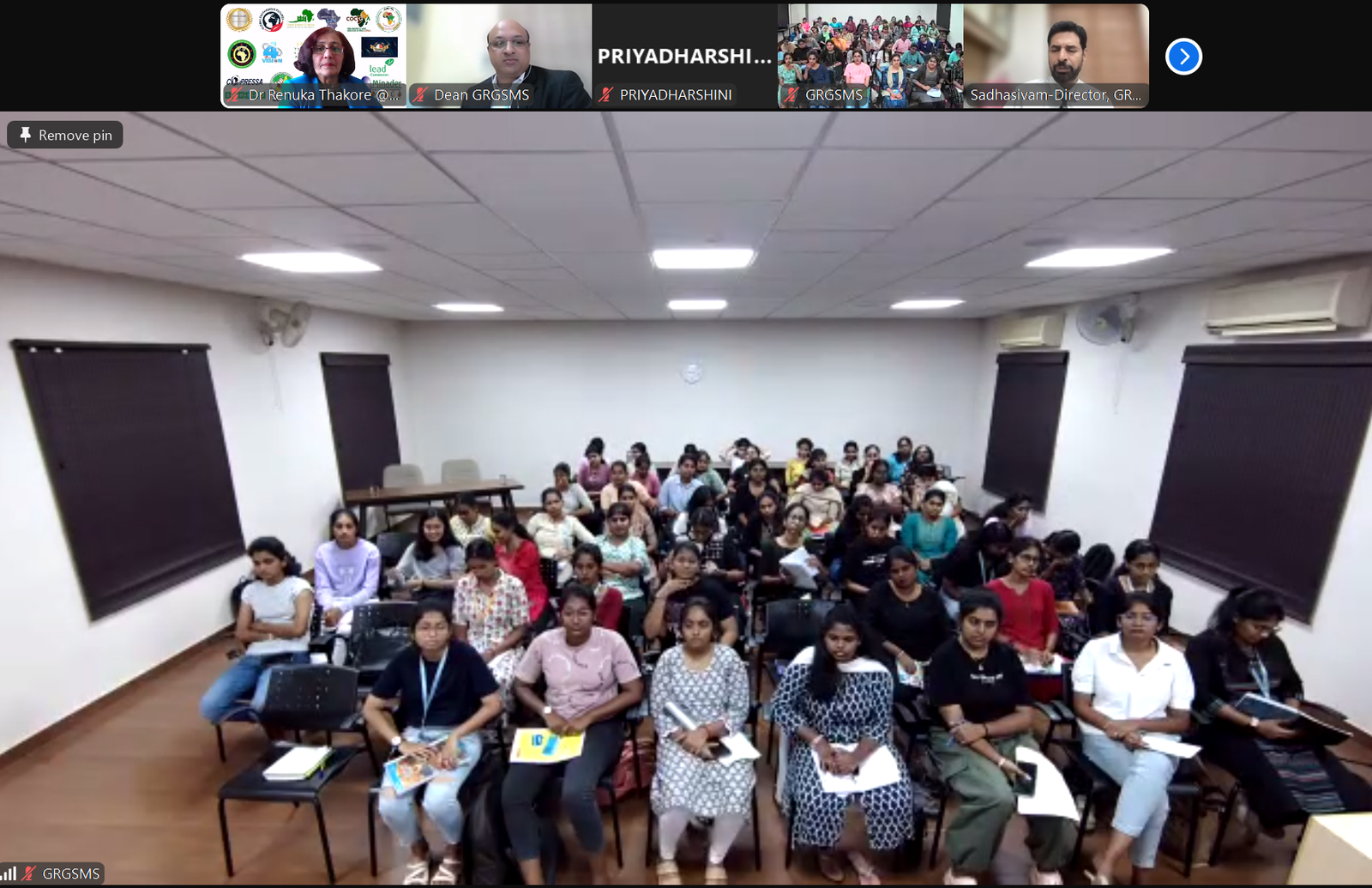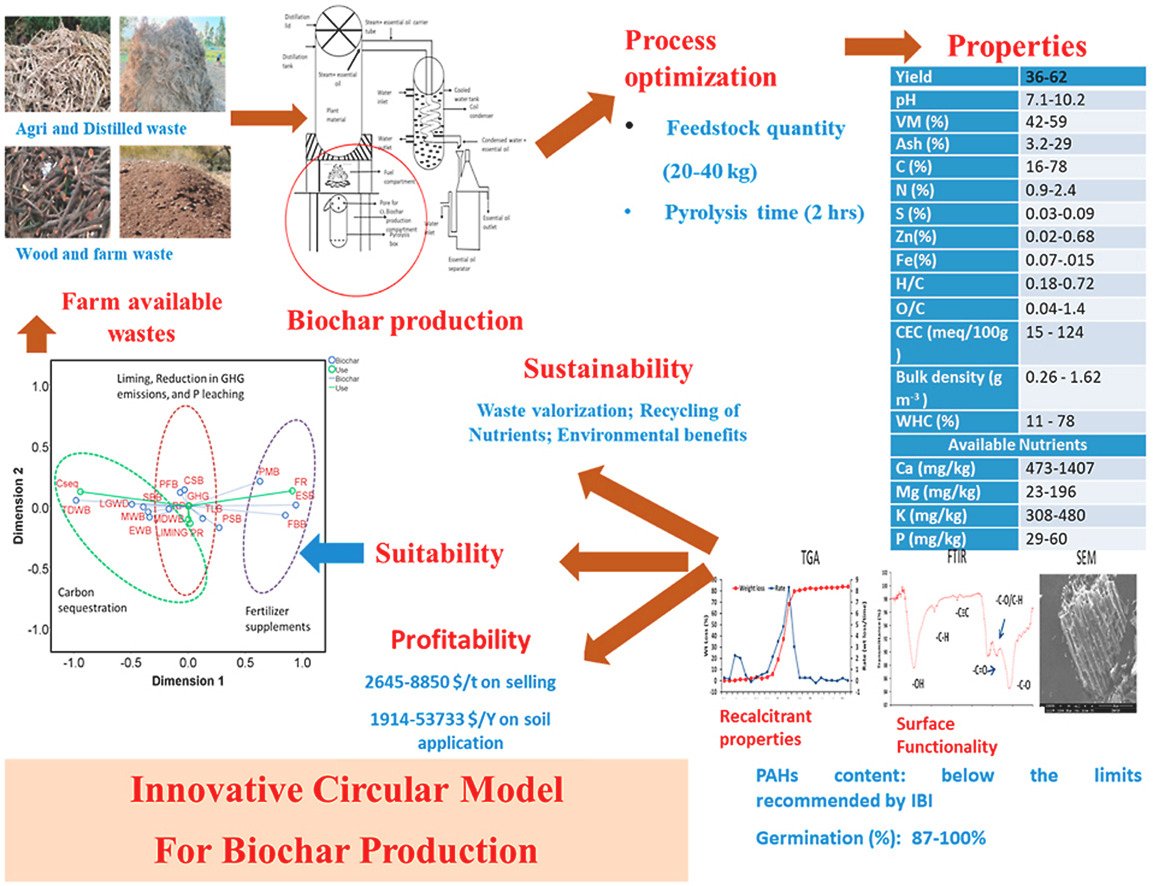Q1: Could you share some insights into your work with the Global Sustainable Futures Network (GSFN) and how it contributes to driving sustainable impact?
A1: As the Founder and CEO of Global Sustainable Futures Network (GSFN), I lead a dynamic global community committed to advancing sustainable development and climate resilience, particularly across the Global South. GSFN works at the intersection of climate action, carbon accounting, biodiversity conservation, and sustainable development, contributing to the achievement of the Sustainable Development Goals (SDGs) and the Paris Agreement targets.
Key Contributions of GSFN to Sustainable Impact are in the following areas:
- Empowering Communities Through Climate Action: GSFN collaborates with local communities, educational institutions, and grassroots organisations to empower individuals with knowledge and skills to tackle climate change. We equip them with the tools to adopt sustainable practices and advocate for environmental stewardship.
- Capacity Building and Leadership Development: We conduct workshops, training, and capacity-building programs focused on climate action, carbon accounting, and Environmental, Social, and Governance (ESG) principles. Our goal is to cultivate a new generation of climate leaders who can drive long-lasting change from within their communities.
- Localizing Global Goals: GSFN is pioneering efforts to localise Nationally Determined Contributions (NDCs) and SDGs, ensuring that global frameworks are adapted to local contexts. Through our Global South Summits, we foster dialogue and create actionable pathways to address unique challenges faced by communities.
- Policy Advocacy and Multi-Level Engagement: We engage with policy leaders, governments, and international bodies to promote inclusive policies that prioritise sustainability. GSFN’s involvement in UNFCCC and COP processes amplifies the voices of marginalised communities, ensuring that local realities are reflected in global climate policies.
- Green Economy and Sustainable Entrepreneurship: Our GSFN Green Awards recognise and promote enterprises that integrate sustainability into their operations, driving economic growth while preserving natural ecosystems.
- Creating a Global Network of Changemakers: With 1000+ researchers, vice-chancellors, deans, and policymakers from 175+ countries, GSFN fosters a multi-disciplinary and cross-sectoral approach to tackle climate challenges. Our platform encourages collaboration between academia, business, and civil society to co-create innovative solutions.
Through these efforts, GSFN is not only addressing climate challenges but also nurturing resilient communities, accelerating sustainable transformation, and ensuring that no one is left behind.
Q2: What inspired you to focus your career on climate action, carbon accounting, and ESG?
A2: My journey into climate action, carbon accounting, and ESG was driven by a profound realisation during my PhD research—a critical gap between global targets and policies and local actions. I observed that while international frameworks such as the SDGs and Paris Agreement outline ambitious goals, the translation of these policies into actionable steps at the local level was often fragmented and ineffective.
Additionally, I identified a lack of stakeholder engagement at multiple levels—from grassroots communities to policymakers—leading to missed opportunities for inclusive and sustainable development. This disconnect fuelled my determination to bridge these gaps by fostering multi-level collaboration and empowering communities to take ownership of their development trajectories.
My core objective is driven by a deep commitment to decreasing inequalities and creating opportunities for marginalized communities, I have made it my mission to ensure that vulnerable populations and those who have never had access to resources are included in the journey towards sustainable development. I strongly believe that climate action must be inclusive and equitable, giving voice to those often left behind in global conversations.
My PhD findings further confirmed that a lack of leadership and regulatory frameworks significantly hinders the ability of communities to transition to sustainable practices. I realized that without building local leadership capacity and establishing a supportive policy environment, achieving meaningful progress in climate action and sustainable development remains a distant goal.
This realization ignited my passion to focus on capacity building, leadership development, and policy advocacy—empowering communities, strengthening governance, and driving a global movement that translates climate commitments into tangible, localized outcomes. Through my work with GSFN and beyond, I remain dedicated to creating a world where sustainability is not just an aspiration but a reality for all.
Q3: What are some of the most significant trends you’ve observed in the field of sustainability over the past few years?
A3: I have observed trends underscore a holistic and inclusive approach to sustainability, with greater accountability, innovation, and community involvement at its core, some of which are:
- Increased Focus on Climate Resilience and Adaptation
There has been a noticeable shift from just mitigating climate change to building resilient communities that can adapt to its impacts. Governments, businesses, and civil society are now prioritising climate adaptation strategies that protect vulnerable populations, especially in developing regions prone to natural disasters.
- Mainstreaming of ESG and Sustainable Finance
Environmental, Social, and Governance (ESG) principles have moved from being optional to becoming a core business strategy for organizations worldwide. Investors and stakeholders increasingly demand transparency, accountability, and alignment with sustainability goals, making ESG performance a critical metric for assessing long-term business success.
- Localisation of Global Goals and SDGs
A growing recognition that achieving the Sustainable Development Goals (SDGs) requires context-specific, localized solutions has driven more efforts toward bottom-up approaches. Local communities are now being empowered to tailor solutions to their unique challenges, ensuring that global targets translate into real, measurable impacts.
- Corporate Shift Toward Net-Zero and Carbon Neutrality
The race to achieve net-zero emissions has gained momentum, with many corporations committing to carbon neutrality by 2050 or sooner. Companies are actively investing in carbon accounting, renewable energy, and carbon offset initiatives to meet these ambitious targets.
- Digital Transformation and Technology for Sustainability
The use of AI, IoT, and blockchain has revolutionised how data is used to monitor and track sustainability progress. Technologies such as satellite imagery, predictive analytics, and smart sensors are now enhancing climate monitoring, carbon accounting, and supply chain transparency.
- Youth Leadership and Climate Advocacy
Youth are no longer passive stakeholders but active changemakers driving the sustainability agenda. The rise of youth-led climate movements and their increasing influence in policy and decision-making processes is a significant trend that continues to gain momentum.
- Circular Economy and Waste Reduction
The shift toward a circular economy—where resources are reused, recycled, and regenerated—has gained traction across industries. Businesses and communities alike are embracing models that reduce waste, promote sustainable consumption, and extend the lifespan of products.
- Integration of Indigenous Knowledge and Nature-Based Solutions
There is growing recognition of the value of Indigenous knowledge and traditional practices in environmental conservation and climate adaptation. Nature-based solutions (NbS) that align with local ecosystems and respect Indigenous knowledge are gaining prominence in sustainability frameworks.
- Collaborative Multi-Stakeholder Approaches
Public-private partnerships (PPPs) and multi-stakeholder collaboration models are becoming essential in addressing complex sustainability challenges. These partnerships foster innovation, pool resources, and drive collective impact across sectors.
- Focus on Climate Justice and Equity
Sustainability conversations increasingly address climate justice, equity, and inclusion issues, ensuring that marginalised communities, often most affected by climate change, are prioritised in the transition to a sustainable future.
Q4: How can companies balance financial performance with social responsibility?
A4: Some of the key strategies can help companies balance financial performance with social responsibility:
- Embed ESG into Core Business Strategy
Companies should integrate Environmental, Social, and Governance (ESG) principles into their strategic decision-making processes. By aligning long-term financial goals with sustainability objectives, businesses can identify growth opportunities while minimizing environmental and social risks. ESG-driven companies often outperform their peers by gaining investor confidence and maintaining a positive brand reputation.
- Adopt a Triple Bottom Line Approach (People, Planet, Profit)
Businesses can embrace the Triple Bottom Line (TBL) framework, which evaluates success beyond just financial performance by considering:
- People: Enhancing social well-being and promoting fair labour practices.
- Planet: Reducing environmental impact and ensuring resource sustainability.
- Profit: Ensuring financial viability to sustain long-term growth.
This balanced approach helps businesses create shared value for all stakeholders.
- Invest in Sustainable Innovation and Circular Economy
Companies can reduce costs and generate new revenue streams by adopting circular economy models that promote resource efficiency, waste reduction, and product lifecycle extension. Innovations in green technologies, renewable energy, and low-carbon processes can not only drive cost savings but also position the company as a sustainability leader.
- Engage Stakeholders and Build Trust
Transparent communication and collaboration with key stakeholders—including employees, customers, investors, and local communities—are essential. Engaging stakeholders in decision-making processes and addressing their concerns builds trust, enhances brand reputation, and mitigates potential non-compliance or public scrutiny risks.
- Set Measurable Sustainability Goals and Report Progress
Companies should establish clear, measurable sustainability goals and commit to regular progress reporting through frameworks such as:
- Global Reporting Initiative (GRI)
- Task Force on Climate-related Financial Disclosures (TCFD)
- Sustainability Accounting Standards Board (SASB)
Transparent disclosure of sustainability performance enhances accountability and demonstrates a commitment to balancing financial and social objectives.
- Leverage CSR and Impact Investment Initiatives
Corporate Social Responsibility (CSR) programs can address community needs and environmental concerns while aligning with business objectives. Similarly, companies can explore impact investments that generate positive social and environmental outcomes alongside financial returns, driving both impact and profitability.
- Empower Employees and Foster a Culture of Sustainability
Companies that promote sustainability values within their workforce benefit from increased employee engagement, productivity, and retention. Training programs, incentives, and leadership development in sustainability practices empower employees to contribute to the company’s overall sustainability goals.
- Adopt Inclusive and Equitable Business Models
Ensuring diversity, equity, and inclusion (DEI) in the workforce and supply chain not only drives innovation but also enhances the company’s reputation. Inclusive business models that engage marginalized communities can create new markets and build stronger customer loyalty.
- Align Incentives and Executive Compensation with Sustainability Goals
Tying executive compensation to the achievement of sustainability targets ensures that leadership is accountable for driving both financial and social performance. Performance-based rewards linked to ESG outcomes can motivate leadership to prioritize long-term, sustainable growth.
- Form Strategic Partnerships for Greater Impact
Companies can collaborate with NGOs, government bodies, and industry peers to address systemic challenges that require collective action. Strategic partnerships enhance access to resources, expertise, and markets, enabling companies to scale impact while maintaining profitability.
By embedding sustainability into the DNA of their operations, companies can future-proof their business models, enhance brand loyalty, and create lasting positive impacts on society and the environment—ultimately driving both financial and social success.
Each of these strategies can be studied through GSFN education/training programs.
Q5: What advice do you have for young entrepreneurs interested in sustainability?
A5: Young entrepreneurs must do the following;
- Start with Purpose and Passion
Build your business around a mission that addresses a real-world sustainability challenge. Whether it’s reducing carbon emissions, promoting circular economy models, or empowering marginalized communities, a purpose-driven venture will inspire others and attract like-minded partners and investors.
- Understand the Local Context
Sustainability solutions must be adapted to local realities. Take time to understand the needs, cultures, and challenges of the communities you aim to serve. Tailoring your approach ensures that your impact is meaningful and your solutions are scalable.
- Educate Yourself Continuously
Sustainability is a rapidly evolving field, with new technologies, policies, and frameworks emerging regularly. Stay informed about global initiatives like the UN Sustainable Development Goals (SDGs), Paris Agreement, and ESG standards to ensure your business aligns with the latest trends and regulations.
- Think Long-Term and Build for Impact
Sustainability is about creating long-term value. Focus on durability, resilience, and adaptability while developing your business model. Consider the triple bottom line—People, Planet, and Profit—and ensure that your venture balances financial success with positive social and environmental impact.
- Innovate with a Circular Mindset
Embrace circular economy principles by designing products and services that minimize waste, maximize resource efficiency, and promote reuse and recycling. Innovation in sustainable materials, processes, and business models can give you a competitive edge in the growing green economy.
- Collaborate and Build Strong Partnerships
No one can solve global challenges alone. Partner with NGOs, governments, industry leaders, and academic institutions to co-create solutions, leverage expertise, and amplify your impact. Strategic alliances will enhance your credibility and open doors to new opportunities.
- Leverage Technology for Sustainable Solutions
Technology is a powerful enabler of sustainability. Explore digital tools, AI, IoT, and blockchain to optimize supply chains, track environmental impacts, and develop innovative climate solutions. Tech-driven sustainability ventures can scale rapidly and deliver measurable outcomes.
- Engage and Empower Local Communities
Sustainable ventures succeed when they empower local communities. Involve communities in decision-making processes, create opportunities for skill development, and ensure that your solutions address their needs and aspirations.
- Embrace Failure as a Learning Opportunity
Entrepreneurship comes with challenges. Don’t be afraid to experiment, learn from failures, and iterate. Sustainability-driven innovations often require trial and error before achieving meaningful impact.
- Measure Impact and Be Transparent
Develop a robust impact measurement system to track progress and report outcomes. Use internationally recognized frameworks such as B Corp, GRI, or SDG indicators to showcase your business’s contributions to sustainable development. Transparency builds trust with stakeholders and attracts potential investors.
- Seek Mentors and Join Sustainability Networks
Connect with mentors, sustainability experts, and fellow entrepreneurs who can provide guidance, share experiences, and offer insights. Join platforms like GSFN (Global Sustainable Futures Network), Climate Action Networks, or Green Entrepreneurship Hubs to stay connected and learn from a global community.
- Secure Sustainable Funding and Explore Green Finance
Look for impact investors, green bonds, grants, and venture capital that prioritize funding sustainability-focused businesses. Explore opportunities with organizations that align with your mission and can help scale your venture.
- Final Thought
“Be bold, think differently, and make sustainability the cornerstone of your business. You have the power to drive meaningful change while creating profitable, lasting solutions. The world needs more young leaders committed to shaping a greener, more equitable future.”






